MARLBOROUGH, Mass.--(BUSINESS WIRE)--Dec 18, 2024--
Hologic, Inc. (Nasdaq: HOLX) today announced that it has entered into an agreement with the Centers for Disease Control and Prevention (CDC) to develop analyte specific reagents (ASRs) — the “active ingredients” of laboratory-developed tests used to identify specific diseases or conditions — that would aid in the detection of H5N1 bird flu.
This press release features multimedia. View the full release here: https://www.businesswire.com/news/home/20241218942183/en/
H5N1 bird flu, also known as avian influenza A (H5N1), continues to spread among wild birds worldwide and is causing outbreaks in poultry and dairy cows in the U.S., with several recent cases identified in humans who work with these animals. 1 Illness from the virus in the U.S. has been mild but severe illness in other countries has been associated with this virus. 2 To prepare for if the current outbreak worsens, Hologic will work with the CDC to develop reagents that may be used for H5N1 testing.
“During the COVID-19 pandemic, our teams pivoted rapidly and rose to the challenge of developing critical tests to help curtail the virus’s spread,” said Jennifer Schneiders, Ph.D., President, Diagnostic Solutions. “Hologic’s proven expertise in assay development, innovative instrumentation and extensive reach uniquely position us well to proactively address ever evolving and emerging public health threats.”
The contract will fund proof-of-concept development of ASRs — primers and probes, in this case — that could eventually be incorporated into laboratory-developed tests (LDTs) designed to detect H5N1. While Hologic does not currently intend to make these ASRs commercially available, the company may explore future commercialization should the need for rapid implementation of H5N1 testing arise.
The ASRs are being developed on the Panther Fusion ® system, a fully automated molecular testing platform that allows labs to quickly consolidate and run multiple assays for women's health, infectious disease and SARS-CoV-2 (COVID-19) testing.
The high-throughput Panther ® system has an extensive presence throughout the laboratory community, with more than 1,700 systems installed in public health laboratories, hospitals and private reference laboratories across the U.S. Nearly 500 of the U.S. Panther systems installed are Panther Fusion systems, which can generate over 1,000 results in 24 hours and have the flexibility to rapidly scale up testing capacity without the need for additional instruments or operator training in the event of an outbreak or pandemic.
Hologic’s Open Access ® functionality on the Panther Fusion system also allows labs to develop and automate their own LDTs using a workflow that is easily integrated with U.S. Food and Drug Administration (FDA)-approved in vitro diagnostic (IVD) assay workflows on the system. This can help save time and labor compared with more manual, low-throughput molecular testing workflows.
The development of these ASRs for detection of H5N1 bird flu builds on Hologic’s existing strong portfolio of diagnostic solutions, including assays used for detection of COVID-19. In 2020, Hologic rapidly developed the Panther Fusion ® SARS-CoV-2 assay and the Aptima ® SARS-CoV-2 assay. These tests played a critical role in the global pandemic response, with more than 68 million shipped to 40 countries in 2020 alone. The company continues to innovate in this area, most recently with FDA clearance in 2023 of a test that can detect SARS-CoV-2, influenza A and B, and RSV in a single patient sample.
For more information, please visit www.hologic.com.
About Hologic, Inc.
Hologic, Inc. is a global leader in women’s health dedicated to developing innovative medical technologies that effectively detect, diagnosis and treat health conditions and raise the standard of care around the world. To learn more, visit www.hologic.com and connect with us on LinkedIn, Facebook, X (Twitter),Instagram and YouTube.
Forward-Looking Statements
This news release may contain forward-looking information that involves risks and uncertainties, including statements about the use of Hologic products. There can be no assurance these products will achieve the benefits described herein or that such benefits will be replicated in any particular manner with respect to an individual patient, as the actual effect of the use of the products can only be determined on a case-by-case basis. In addition, there can be no assurance that these products will be commercially successful or achieve any expected level of sales. Hologic expressly disclaims any obligation or undertaking to release publicly any updates or revisions to any such statements presented herein to reflect any change in expectations or any change in events, conditions or circumstances on which any such data or statements are based.
Hologic, The Science of Sure, Aptima, Open Access, Panther and Panther Fusion are trademarks and/or registered trademarks of Hologic, Inc. and/or its subsidiaries in the United States and/or other countries.
References
1 Centers for Disease Control and Prevention. H5 Bird Flu: Current Situation. https://www.cdc.gov/bird-flu/situation-summary/index.html
2 Centers for Disease Control and Prevention. What Causes Bird Flu Virus Infections in Humans? https://www.cdc.gov/bird-flu/virus-transmission/avian-in-humans.html
SOURCE: Hologic, Inc.


Panther Fusion® system (Photo: Business Wire)










